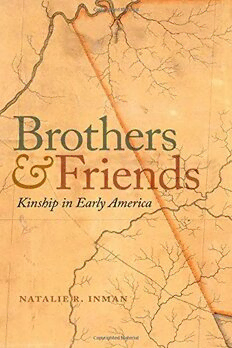
Brothers and Friends: Kinship in Early America PDF
Preview Brothers and Friends: Kinship in Early America
Brothers and Friends This page intentionally left blank Early American Places is a collaborative project of the University of Georgia Press, New York University Press, Northern Illinois University Press, and the University of Nebraska Press. The series is supported by the Andrew W. Mellon Foundation. For more information, please visit www.earlyamericanplaces.org. Advisory Board Vincent Brown, Duke University Andrew Cayton, Miami University Cornelia Hughes Dayton, University of Connecticut Nicole Eustace, New York University Amy S. Greenberg, Pennsylvania State University Ramón A. Gutiérrez, University of Chicago Peter Charles Hoffer, University of Georgia Karen Ordahl Kupperman, New York University Joshua Piker, College of William & Mary Mark M. Smith, University of South Carolina Rosemarie Zagarri, George Mason University This page intentionally left blank Brothers and Friends Kinship in Early America natalie r. inman The University of Georgia Press athens © 2017 by the University of Georgia Press Athens, Georgia 30602 www.ugapress.org All rights reserved Most University of Georgia Press titles are available from popular e- book vendors. Printed digitally Library of Congress Cataloging- in- Publication Data Names: Inman, Natalie Rishay. author. Title: Brothers and friends : kinship in early America / Natalie R. Inman. Other titles: Early American places. Description: Athens, Georgia : The University of Georgia Press, [2017] | Series: Early American places | Includes bibliographical references and index. Identifiers: LCCN 2016055415 | ISBN 9780820351094 (hardback : alk. paper) | ISBN 9780820351100 (ebook) Subjects: LCSH: Kinship—United States—History—18th century. | Kinship—United States—History—19th century. | Families—United States—History—18th century. | Families—United States—History—19th century. | Cherokee Indians—Kinship. | Chickasaw Indians—Kinship. | Donaldson family. | Social networks—United States—History. Classification: LCC HQ535 .I56 2017 | DDC 306.850973—dc23 LC record available at https://lccn.loc.gov/2016055415 Contents Introduction: Comparing Families in Cultural and Political Borderlands 1 1 Founding Networks, 1740– 1765 15 2 Militant Families: Kinship in the American Revolution 35 3 Ongoing Warfare: Indian Resistance and Accommodation 55 4 The Donelsons: Social, Political, and Economic Expansion on the Frontier 76 5 Family Strategies and “Civilization” 90 6 Creek War Family Networks 107 7 Kinship Networks and Evolving Concepts of Nationhood 118 Conclusion: Piecing Together a New Society from the Remnants of the Old 135 Notes 143 Index 169 This page intentionally left blank Introduction: Comparing Families in Cultural and Political Borderlands In 1853, eighty- year- old Joseph Brown, a resident of Tennessee, gave several interviews telling of his experiences as a teenager. Brown told audiences that he had been traveling with his family on flatboats in 1788 when his boat was boarded by Chickamauga Cherokee Indians, a faction of Cherokees that had declared war on those moving into their hunting grounds in the region that would become Tennessee. During the raid, Brown’s father was killed in front of him. He recalled that when a “dirty, black looking Indian” robbing their boat was “about to kill” him, his father saved him, but at the cost of his own life: The Indian then let me go, but as soon as my father’s back was turned, he struck him with the sword, and cut his head nearly half off. Another Indian then caught my father, and threw him over- board. I saw him go overboard, but did not know that he was struck with the sword; it astonished me, therefore, to see him sink down, as I knew him to be a good swimmer. As this took place in the stern, and my brothers and the other young men were with Vann [the Chickamauga man who translated for the group of Indians] in the bow, I went to them, and told them that an Indian had thrown our father overboard, and he was drowned.1 Joseph Brown, then fifteen years old, was led, along with several other children and women, to a nearby village to spend the night. The captive men stayed on board to travel farther downstream to another village. After a few minutes, Brown heard gunfire that signaled to him the end
